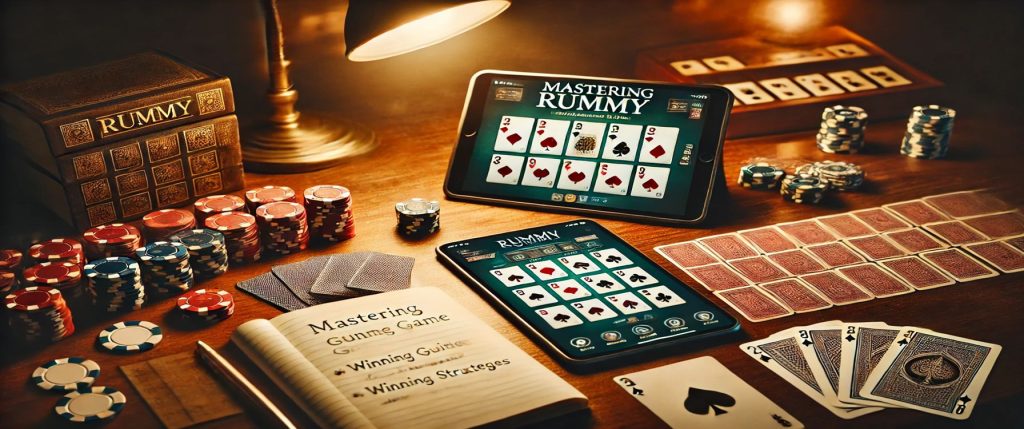Description

Mastering Rummy: A Complete Guide For generations, players have been enthralled with the timeless card game of rummy. Both serious competitors & casual players like it because of its unique combination of skill, strategy, & a little bit of luck. Understanding the basic rules governing rummy is a prerequisite for becoming a true expert at the game. Forming sets and sequences out of the cards in your hand is the fundamental idea behind rummy.
A run of three or more consecutive cards of the same suit is called a sequence, whereas a set is made up of three or four cards of the same rank but different suits. Combining these cards into legitimate combinations is the goal in order to lower the number of points in your hand and win the game. Understanding Rummy’s rules and variations is crucial because each version may have its own twists that affect strategy. Knowing the idea of turns and how to use them efficiently is another aspect of comprehending the fundamentals of rummy. After taking turns drawing cards from the discard pile or the stockpile, each player discards one card from their hand. This cycle keeps going until either the stockpile runs out or one player successfully melds all of their cards.
Selecting which cards to keep and which to discard requires strategic thinking because it can greatly affect your chances of winning. Players also need to be aware of the scoring system, which usually at the end of a round gives unmelded cards in hand point values. Players can create a strong base from which to build more complex strategies by becoming proficient in these fundamental elements.
Success in rummy requires a winning mindset, which includes both emotional fortitude and strategic thinking. Gamers need to adopt an optimistic mindset, seeing every game as a chance to grow and learn rather than just a contest to win. This viewpoint enables players to maintain composure under duress, which facilitates the analysis of both their own & their opponents’ movements. Adopting a growth mindset can help you make better decisions and be more flexible when playing games. The ability to remain composed and concentrate on future opportunities can greatly improve performance when faced with setbacks, such as losing a round or drawing unfavorable cards.
Also, cultivating a winning mindset entails establishing reasonable expectations and goals for oneself. Players should strive to improve their abilities and tactics over time rather than focusing only on winning every game. Long-term improvement requires self-reflection and consistent practice, both of which are promoted by this method.
Also, realizing that Rummy is a game of chance can lessen frustration when results fall short of expectations. Players can cultivate an attitude that not only improves their enjoyment of the game but also raises their chances of success by striking a balance between ambition and perseverance and patience. One important part of rummy that new players frequently ignore is discarding.
Your hand and your opponents’ strategies may be significantly impacted by the card you decide to discard. You can advance your own game plan and thwart an opponent’s possible melds with a well-timed discard. For example, it might be prudent to discard cards that are less likely to help your opponent reach a set or sequence if you observe them selecting cards from the discard pile. Players must continuously assess not only their own hands but also the possible effects of their discards on other players, which adds another level of complexity to the game. Also, good hand management requires knowing when to hold onto particular cards and when to release them. Players ought to pay attention to the cards they are gathering & how each one fits into their larger plan.
You can reduce your possible losses if another player goes out before you have melded your hand by discarding high-point cards early in the game. On the other hand, it may be beneficial to hold onto cards that are almost ready to form a meld if you think you can finish it in later turns. Players can greatly increase their strategic depth and raise their chances of winning at rummy by becoming proficient in the art of discarding.
Two strong Rummy tools that can significantly change the game’s dynamics are jokers and wild cards. These cards can be used in place of any other card, making it easier for players to finish sequences and melds. Being able to use these wild cards well can give you a big edge over opponents who might not be as skilled at using them in their strategies. For example, you can use a joker to finish a set or sequence that would be impossible with your current cards.
This adaptability fosters greater creativity in meld formation and frequently results in unanticipated successes. However, using jokers sparingly is crucial. Even though they can be very helpful, depending too much on them could result in lost chances to create more conventional melds with ordinary cards. Also, when using wild cards, players should exercise caution to avoid giving away too much information as this could give opponents a better idea of your strategy & enable them to counter your moves more successfully. The secret to mastering Rummy and making sure that your strategy is unpredictable is striking a balance between using jokers and conventional card play.
The foundation of rummy strategy is the creation of melds and sets, which calls for both preparation and flexibility. In addition to taking into account the cards drawn from the stockpile & those in the discard pile, players must continuously evaluate their hands for possible combinations. In addition to concentrating on finishing their own melds, a successful player will also monitor what their rivals are gathering. Strategic choices about which cards to keep or discard based on what might help or impede others’ progress are made possible by this dual focus. Also, risk management and probability comprehension are necessary for creating melds.
Players have to balance the possible advantages of holding onto particular combinations in their hands against the possibility of drawing particular cards. It might be worthwhile to keep other related cards and discard less useful ones if, for instance, you are almost done with a sequence but are missing one important card. Because of this strategic balancing act, Rummy is both difficult and rewarding; good players learn to handle these complexities while maintaining the flexibility to modify their tactics as the game progresses. In rummy, being able to pay close attention to your opponents’ moves is one of the most important yet frequently underappreciated skills.
By keeping an eye on the cards they draw and discard, players can learn a lot about their tactics and possible melds. For example, it might be a sign that an opponent is trying to finish particular sets or sequences if they routinely remove particular kinds of cards from the discard pile. You can use this information to guide your own choices about which cards to keep or discard, upending their plans while furthering your own. Further hints about opponents’ confidence levels and tactics can also be found by watching their body language and reactions while playing.
A player who seems nervous or unsure might be having trouble with their hand, but a player who makes decisions quickly might be feeling good about their development. You can get a big advantage over your rivals by improving your observational abilities, which will enable you to predict their moves and modify your approach appropriately. Because it directly affects your ability to form melds & minimize points at the end of each round, effective hand management is essential for success in rummy.
Gamers must continuously assess their hands for possible combinations & think about the best ways to use each card they are holding. This entails not only figuring out which cards are necessary to finish melds but also figuring out when unmelded cards at the end of a round could turn into liabilities. Better hand management increases the possibility of successfully melding all cards before opponents and gives players more gameplay flexibility.
Also, a balance between aggression and caution is necessary for effective hand management. Keeping high-point cards in the hopes of later forming melds may seem alluring, but if another player goes out first, doing so can result in significant point losses. Discarding too aggressively, on the other hand, could leave you exposed if you don’t finish your own melds in time. Finding this balance is essential; proficient players learn to modify their hand management techniques in response to the game’s flow and their opponents’ moves.
One part of rummy strategy that is frequently disregarded but has a big influence on performance is knowing when to quit a round. When players know they won’t likely finish their melds before an opponent goes out, they can drop to reduce point losses. The state of play surrounding you as well as your current hand must be carefully considered when making this decision.
Dropping might be the wisest move if you find yourself holding onto high-point cards with little chance of creating combinations that make sense. Also, determining when to drop requires evaluating both your opponents’ and your own hand progress. One player may be about to go out if you observe that they are making multiple melds or are constantly taking from the stockpile. Dropping early in these situations can prevent you from earning extra points at the end of the round.
The ability to read the game well & make prompt decisions that fit their overall strategy are ultimately skills that successful players acquire via practice and careful observation. In summary, mastering Rummy requires a multifaceted approach that includes knowing the fundamentals, cultivating a winning mindset, strategically discarding, using jokers effectively, forming melds, observing the moves of opponents, effectively managing one’s hand, and knowing when to drop out of a round. A player’s overall success in this captivating card game is influenced by each component. Players can improve their gameplay and take advantage of the rich strategic depth that Rummy offers by refining these abilities via practice and introspection.

